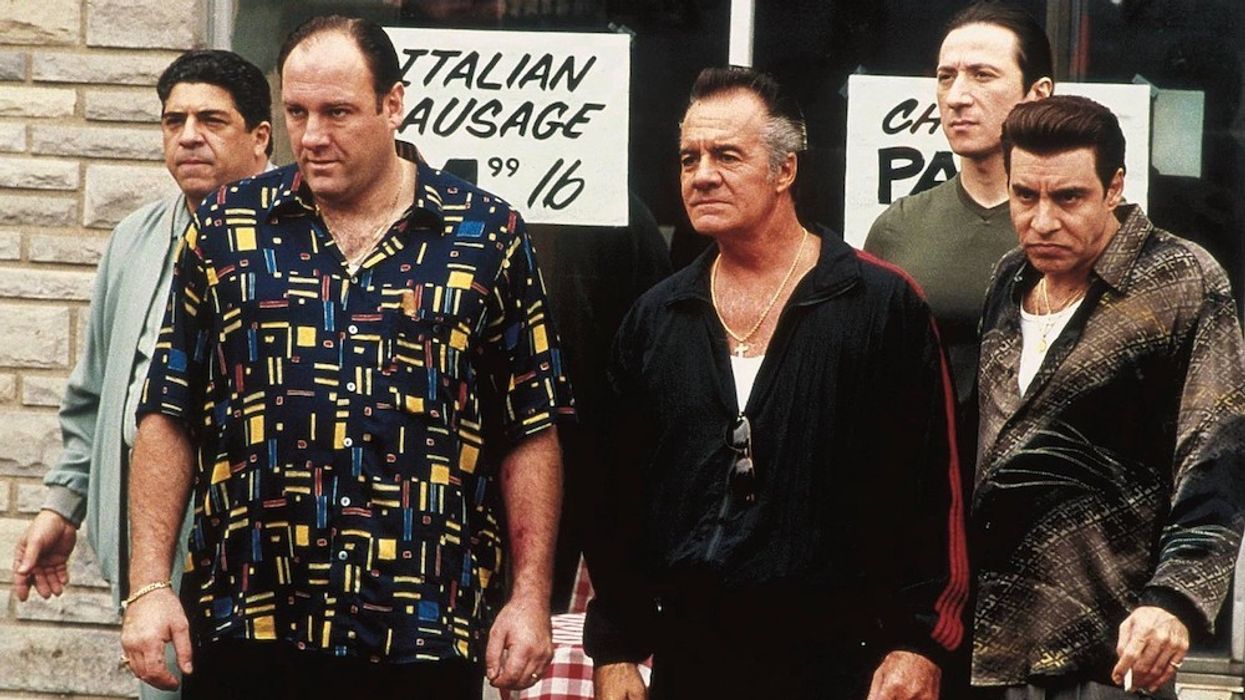5 Things the Writers of 'The Sopranos' Can Teach You About Storytelling
A dream Zoom meeting for writers everywhere.

One of the only great side effects of the coronavirus is that a ton of places are churning out excellent content to entertain us and even teach us. Enter the WGA, when they're not fighting the good fight, they're helping younger writers by organizing free panels given by experts.
Today's panel was filmed back on April 8th.
The WGA reunited The Sopranos creator David Chase with fellow Sopranos writers Terence Winter and Matthew Weiner for a conversation about creating impactful characters, as well as how writing on The Sopranos influenced their careers. They even touch on plotlines that never hit the air.
The panel is moderated by How to Get Away with Murder producer Larry Andries, and of course, it digs into Mad Men, Boardwalk Empire, and their other writing ventures as well.
Check it out below and then let's talk about our 5 biggest takeaways from the video.
5 Things the Writers of 'The Sopranos' Can Teach You About Storytelling
With so much gold being thrown around in the video, it was hard picking 5 of the best moments, but I tried. If you think I missed any, let me know in the comments. Now, let's break down the best bits of advice given.
1. Character First
It's insane to think about the impact these 3 men have had on the writing of arcs and the development of characters on modern television. We have examined the writing in Sopranos and Mad Men and how they echo one another, but the one thing both of those and Boardwalk have in common is their character creation.
All 3 writers said that the way they came up with their series is by finding the characters first, digging deep and doing research into people they thought were interesting and taking meticulous notes on personality.
Then they worked hard to build the plot from there.

2. Commit to the Calendar
All 3 shows had important dates to keep in mind. For Mad Men, it was tracking the '60s all the way into the '70s. Matthew Weiner said every episode was written with a particular day in mind. They could be small or big, like the JFK assassination or a Muhammed Ali fight, but he put intensive research into making sure even if the day was not mentioned, there was historical accuracy.
In Boardwalk, they were balancing crime in America, politics, and the changes happening in the late '20s and early '30s. While not prescribing to the exact day, Winter still had to make sure it all fit.
Chase was similar. 9/11 happened and changed the FBI storyline. He wanted authenticity in his characters, like when AJ decides he wants to learn Farsi to combat terrorism.
Whatever the case, know what's happening in the world.

3. Find Your Routine
Writing is kind of crazy. When you're in a room, they're usually structured with work hours, a lunch hour, and then scattered days when people go out to draft. But if you're home and not involved in those kinds of structures, you have to find out what works with you.
Chase talks about a friend who gets up at 5:30 AM and writes at the crack of dawn.
I have a buddy who writes from 9 PM - 4 AM daily.
Just find what works for you.
A routine can make you feel more relaxed, get you to be prolific, and make you a more confident writer.
So, commit to carving out a writing routine that works for you.

4. Pitch Your Heart Out
Not every great pitch makes it into a TV show. Sometimes, some of the best storylines get left in the dust. On Boardwalk, that was following the death of Arnold Rothstein. They had the desire to do it and thought they could fit it into the show, but the time periods never overlapped.
On Mad Men, it was an arc involving the advertising team and golf.
Weiner could never crack the golf storyline but always had a soft spot for it.
We'll have to see if either of these storylines work their way into future episodes of their next shows.

5. What's Your Voice
Lastly, I wanted to look at the idea of voice. When prompted, each of the writers struggled with the answer. Weiner learned his voice from writing samples and reading other people's samples. He wanted a style, but as he got more mature as a writer, he found that the writers he admired don't have a style.
One of the writers he said he loved reading was Terrence Winter.
Winter says that his first real job was learning to imitate Chase on Sopranos, and even when he left that job he found that his voice on the page stayed the same.
When it came time to staff, Winter found that he was reading amazing scripts with beautiful writers' voices. But when he got some of those people in the room, they couldn't mimic his voice on the page.
It made him pivot when it came to hiring, and to be more cautious.
David Chase dismisses the notion of voice altogether because he doesn't think a writer can learn to find their voice. They just have it. Chase never wants specs of the show he's on. He wants originals and hopes that you can hang.
If you can't, you won't be back.
Chase believes you can't create a voice, you just have one on the page. Some people can do it, and some people can't.

Up next: Write your own drama pilot!
Hundreds of pilots sell to networks and streaming services every year. What's stopping you from selling your idea? Want to learn how to write a TV pilot? You've come to the right place. Keep reading.











